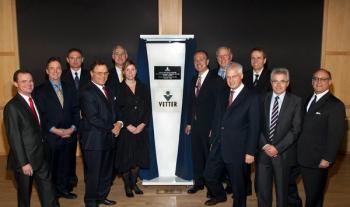
Biotech, and bioprocessing more specifically, is a great place to be. But it's time for a new adventure.
Laura Bush was editor in chief of BioPharm International.

Biotech, and bioprocessing more specifically, is a great place to be. But it's time for a new adventure.

China's regulators acknowledge the quality gap, and have a plan for steady improvement.

Good leaders look beyond industry woes to focus on patients

Industry and regulators disagree over noncritical parameters.

Amgen has issued Epogen and Procrit recall.

Regulators, Industry Disagree Over Noncritical Process Parameters at CMC Forum

The third holy grail of biosimilars: interchangeability.

ImClone, a subsidiary of Eli Lilly, has closed a manufacturing facility at its site in Branchburg, NJ, as originally reported by MyCentralJersey.com and confirmed by BioPharm International.

Regulatory relief requires that regulators trust companies to know what they are doing, and to do it-consistently.

Human Genome Sciences (HGS, Rockville, MD) has selected Lonza (Basel, Switzerland) as its contract manufacturer for the future commercial supply of Benlysta.

After 18 years, Human Genome Sciences (HGS, Rockville, MD) may soon have its first drug on the market. And thanks to a bold scale-up strategy, HGS?s manufacturing organization is ready.

A single standard should apply to all comparability exercises for biologics, be they for biosimilars or manufacturing changes.

As part of a news series on the H1N1 influenza pandemic, BioPharm International interviewed Ben Machielse, Drs., executive vice president of operations at MedImmune, to ask about his company's experience manufacturing vaccines against H1N1.

In February, we reported on Pfizer's plans for reconfiguring its global manufacturing network of 79 plants, following its recent acquisition of Wyeth. Now, we have the answer.

New R&D models must be tried, but it will take time to see if they work. In the meantime, a new kind of threat is on the horizon: biobetters.

Now is not an easy time to lead a pharmaceutical company. The patent cliff is fast approaching, pipeline challenges remain, capital markets are tight, and the blockbuster model is fast on its way out. Meanwhile, regulations on sales and marketing continue to tighten.

We all know that experience is the best teacher. With H1N1, we have a great opportunity to learn important lessons.

Given today's challenges, traditional strategies were bound to change. Now, there is one more big threat (or opportunity?) on the horizon.

Characterizing the higher order structure (HOS) of protein drugs increases manufacturers' understanding of stability and batch-to-batch variability, and may make it possible to link variants or aggregates to safety and efficacy. Yet at the January 24 CMC Strategy Forum in Washington, DC, regulators expressed concern that methods to characterize the three-dimensional structure of proteins are not routinely applied to biotechnology products.

Sharing information is a critical part of security-whether we're protecting travelers from bombs or patients from adulterated medicines.

Following its recent acquisition of Wyeth, Pfizer has 79 manufacturing plants around the world?43 from Pfizer and 36 from Wyeth-and relationships with about 250 contract manufacturers. It?s a wealth of resources, which altogether make 32,000 SKUs. Now, how to consolidate it all?

One might look at QbD's plodding growth and conclude that it is never going to make it to graduation.

QbD has always embraced the notion that companies could make certain process changes without regulatory oversight.

When the CMC Biotech Working Group began developing a case study on applying Quality by Design (QbD) to biotech products, the goal was to challenge conventional thinking on the subject.

The German fill-finish provider Vetter inaugurated a new US facility in Skokie, IL, just outside Chicago, along with a new subsidiary, Vetter Development Services USA Inc.

Do we really have to choose between saving money and saving time?

Following a five-week inspection of Genzyme's plant in Allston Landing, MA, the US Food and Drug Administration is still not satisfied with the company?s large-scale manufacturing of Lumizyme.

What football and bioprocessing both have in common is that in both cases, success is a minimum requirement.

The Korean CMO Celltrion and Hospira, a small-molecule injectable generics and drug delivery company based in Lake Forest, IL, agree to co-market biosimilars developed by Celltrion.

Diminutive bacteria with the right geometry (i.e. very thin) may be useful for research and development work on sterilizing-grade and other 0.2 uM filters, said Kurt Brorson, PhD, a staff scientist for the FDA/CDER's Division of Monoclonal Antibodies.

Published: August 23rd 2010 | Updated:

Published: September 8th 2010 | Updated:

Published: September 1st 2010 | Updated:

Published: March 1st 2010 | Updated:

Published: March 5th 2010 | Updated:

Published: August 1st 2010 | Updated: